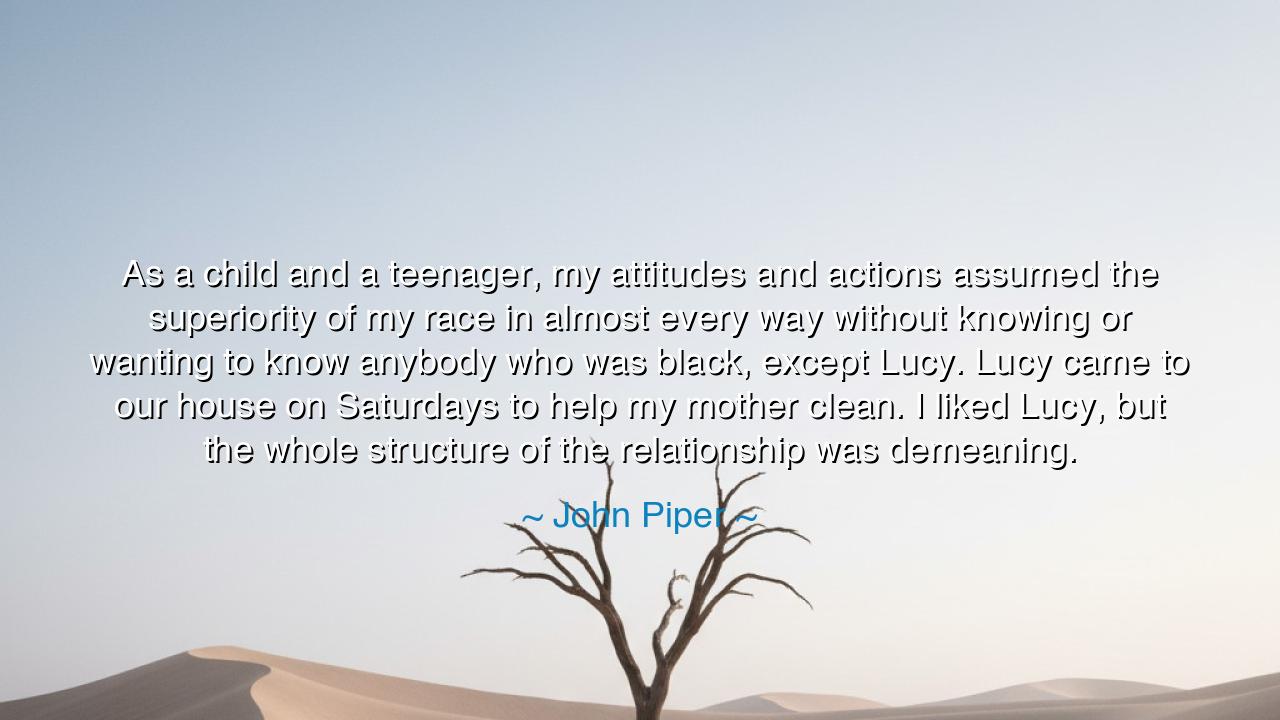
As a child and a teenager, my attitudes and actions assumed the
As a child and a teenager, my attitudes and actions assumed the superiority of my race in almost every way without knowing or wanting to know anybody who was black, except Lucy. Lucy came to our house on Saturdays to help my mother clean. I liked Lucy, but the whole structure of the relationship was demeaning.






In the tender years of youth, the heart is soft clay, shaped by the hands of family, culture, and the unseen currents of society. John Piper, a man of faith and reflection, speaks of his early life with honesty and sorrow. As a child and teenager, he was raised in a world where the superiority of his race was assumed, not by deliberate hatred, but by quiet, unquestioned custom. This unspoken belief, like a shadow, guided his attitudes and actions, shaping the way he saw others and himself, even before he understood its weight or consequence.
Among those caught in this web of inequality was Lucy, a woman who came each week to serve in his home, helping his mother with the labors of cleaning. Though he liked Lucy, Piper now sees that their bond was not one of equals, but of a broken order. The structure of the relationship was demeaning, for it was built on centuries of injustice, where one group stood above another, not by virtue or truth, but by the false walls of prejudice. Even affection, in such a system, could not wash away the deep stains of imbalance and oppression.
This quote speaks not only to Piper’s personal awakening, but to the broader story of nations divided by race. It reveals how ignorance is passed silently from one generation to the next, not always through cruelty, but through the absence of questioning. By confessing his blindness, Piper offers a mirror to all who inherit systems of injustice, showing that evil often thrives not in overt malice, but in the comfort of unchallenged tradition. His awakening begins with the simple act of seeing — truly seeing — the humanity of the other.
From these words springs a call to future generations: do not allow the innocence of youth to be shaped by the lies of division. Seek out those who are different, not as servants or strangers, but as brothers and sisters, equal in dignity and worth. For true reconciliation begins when the structures of demeaning relationships are dismantled, and when hearts are humbled enough to confess, as Piper does, the blindness of the past. Only then can a new foundation be built, one of justice, respect, and shared humanity.






Ttuannn
I can't help but feel a sense of discomfort after reading this. It’s painful to think about how the structure of relationships can be so inherently unequal, even when there’s no overt malice. It makes me wonder how many other children grew up with similar perceptions, and how those ideas continue to impact their adult lives. What does true change look like when it comes to undoing these ingrained beliefs?
PLPhuong Luong
This quote really speaks to the idea of privilege and unconscious bias. As children, we often don't question what we’re taught about race and class, but those lessons can have long-lasting effects. How can we teach the next generation to break down these barriers and foster real understanding and equality, especially when those old structures are so deeply embedded?
BNHa Bang Nguyen
It’s heartbreaking to hear about a relationship like the one Piper describes with Lucy. Even though he liked her, the structure of their relationship was inherently unequal and demeaning. It makes me reflect on how societal norms shape our relationships with others, often in ways that are harmful or unjust. How do we change that power dynamic in society today?
VDnguyen van dat
I find this quote both disturbing and eye-opening. It's troubling to read about how John Piper, even as a child, internalized superiority based on race, even if he wasn’t actively aware of it. It makes me wonder how many people, knowingly or unknowingly, hold similar beliefs today. What does it take for someone to see these biases and start to undo them?
PNPhat Nguyen
This quote is a powerful reflection on the biases we can hold without even realizing it. It makes me think about how deeply ingrained racism can be, especially when you're raised in an environment where those views are never challenged. How do we break free from those assumptions? Can someone truly change their perception once it’s been shaped by their upbringing?